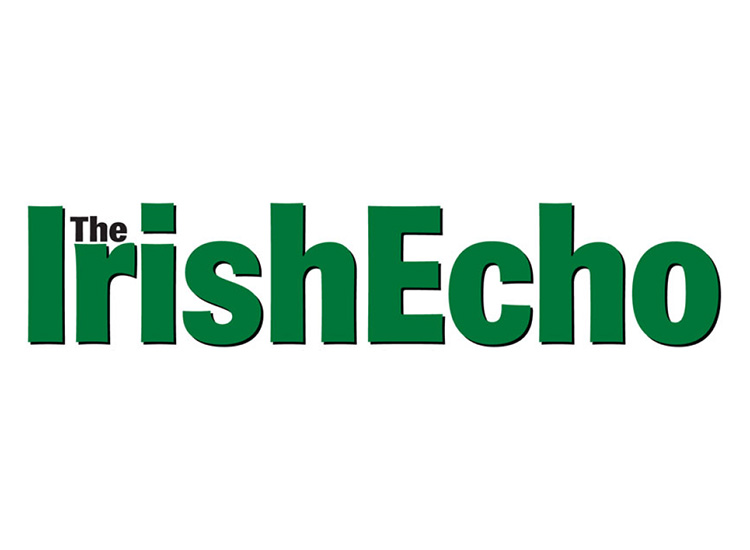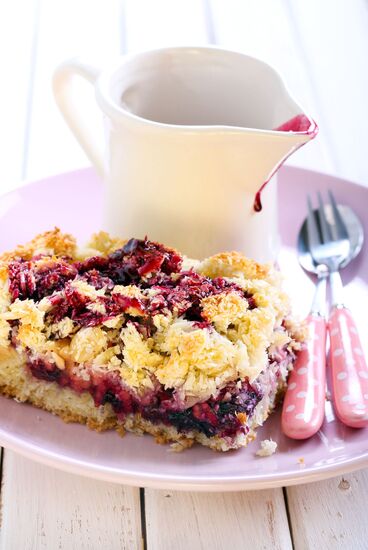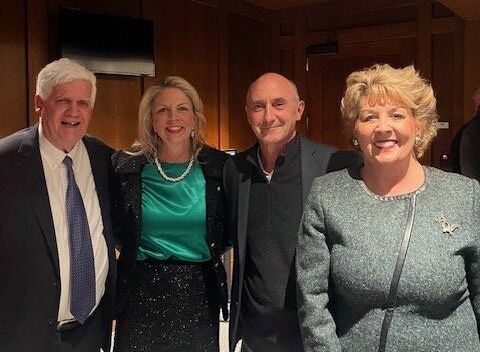Mark Bailey.
PHOTO BY JOSEPH MCDOUGALL
Page Turner / Edited by Peter McDermott
Mark Bailey once read an essay that “quickly beat down a path down to my heart – where it has remained.”
He doesn’t know the name of its author, but he kept a photocopy of the piece in a shoebox of letters for three decades. It told the story of Timothy Francis Meagher and other Young Irelanders who had death sentences commuted to transportation for life to Australia.
The essay, “Nine Famous Irishmen,” revealed that all would go on to high-profile, high-achieving careers far from home.
Most of the story is true, Bailey believes, and some of it is likely mythical, but it speaks to a larger truth for him – which is that “many men, women and children left Ireland, the country of their birth, and went into the world to do great things.”
It helped inspire his latest book, which is about nine Irish people who became famous, though not all of them are men. And it’s about immigration, more generally. Bailey says in the introduction: “I was born here because my great-grandparents, who were Jewish, put their belongings in a bag and boarded a ship. If maybe that sounds easy, it wasn’t.”
As editor of “Nine Irish Lives” Bailey told us, “I asked nine contemporary Irish Americans to each write an essay about an immigrant who inspired them— ordinary people who fled hunger, persecution, and violence—and who, once here, helped make our country extraordinary.”
Here’s the list in full: “Tom Hayden, icon of the sixties, wrote about his namesake, Thomas Addis Emmet, the famed revolutionary leader. Rosie O’Donnell, mother of five adopted children, chose Margaret Haughery, the Mother of Orphans. Political journalist and historian Terry Golway profiled the labor firebrand Mary ‘Mother’ Jones. Poet and LGBT rights advocate Jill McDonough chronicled the life of transgender Civil War soldier Albert Cashier, documentary filmmaker Michael Moore looked at news journalist Samuel S. McClure, the founder of McClure’s Magazine, and Mark Shriver, senior executive for the non-profit Save the Children, wrote about Father Edward Flanagan of Boys Town. Irish-born actor Pierce Brosnan explored the silent-era director Rex Ingram, novelist Kathleen Hill examined New Yorker writer Maeve Brennan, and Pulitzer Prize-winning journalists Mary Jordan and Kevin Sullivan wrote about Niall O’Dowd, journalist and legendary founder of the Irish Voice newspaper.”
Bailey continued: “It's my hope that the lives rendered in this book will not only stand on their own as great biographies, but also serve as a powerful reminder of all the Irish thinkers, fighters, and artists who helped build America.”

Mark Bailey
Date of birth: Nov. 25, 1968
Place of birth: Elizabeth, N.J.
Spouse: Rory Kennedy
Children: Georgia, Bridget, and Zachary Kennedy-Bailey
Residence: Los Angeles
Published works: “American Hollow,” “Hemingway & Bailey's Bartending Guide to Great American Writers,” “Tiny Pie” and “Of All the Gin Joints.”
What is your writing routine? Are there ideal conditions?
Three kids, three dogs, nine chickens, one tortoise and we may be getting goats—this all makes writing in my house a little tricky. I do have an office less than a mile away, but the phones and Internet and lunch opportunities are their own distraction. So I write early in the morning and late at night. Invariably, since those windows of time are fairly narrow, I fall behind on my deadlines. There's that Douglas Adams's quotation, "I love deadlines. I like the whooshing sound they make as they fly by." When this happens, I set off for usually three to five days. I try for a friend's empty house, but will settle for an inexpensive hotel with a small kitchenette—the town must be at least a two-hour drive away so there is no easy returning. Once there, I hunker down and get more writing done in a long weekend than I do in a month.
What advice do you have for aspiring writers?
I have found that there are all kinds of ways to make a life as a writer. For example, in addition to books, I write documentary films and that is massively collaborative. In this, I work with my wife, a director, in a production office. I work with editors, producers, television executives. Documentary writing has its own flow and requires its own skill set. It is very different from writing a book, which is different from editing a book.
So I guess I would suggest that aspiring writers look outside the craft to assess their other strengths and weaknesses. Are you disciplined, stubborn, patient, confident, introverted, social? Do you want to write in an office? Hole up in a cabin? What kind of writing is best suited not only to your talent and voice, but also to your personality? How do you want to spend your days?
Name three books that are memorable in terms of your reading pleasure.
“Billy Phelan's Greatest Game” by William Kennedy; “A Long Long Way” by Sebastian Barry; “Let the Great World Spin” by Colum McCann.
What book are you currently reading?
“Saints for All Occasions” by J. Courtney Sullivan. It is terrific.
Name a book that you were pleasantly surprised by.
“My Wicked, Wicked Ways” by Errol Flynn
What book changed your life?
“On the Road” by Jack Kerouac. I know, sort of a cliché there. But I read the book when I was 15 and fell in love with Kerouac's language, and with the Beats, and with the romantic notion of being a writer.
What is your favorite spot in Ireland?
An impossible question. I suppose I feel the most connected to County Wexford, which is where my wife's family is from. In New Ross, there is a replica of the Dunbrody famine ship at rest on the River Barrow. I visited it, along with my wife and children, when I was working on this book. You look at a little wooden cargo boat like that and you think about all the people over all the years who set off for America under the harshest of circumstances—really just putting it all on the line. And then I think about us, my wife, my children, and I—who were lucky enough to be born here.








